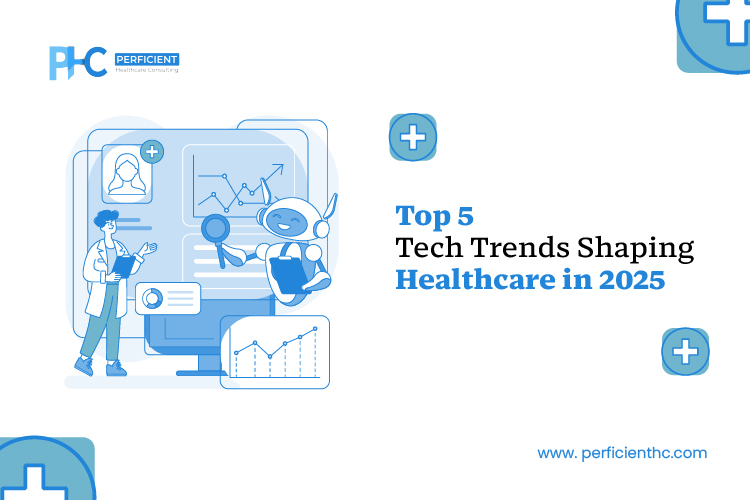Introduction
The healthcare industry is undergoing a major digital transformation and 2025 is set to accelerate that change even further. With rising patient expectations, workforce challenges, and the need for smarter, more connected care, technology is no longer a nice-to-have. It is the foundation of future-ready healthcare.
From artificial intelligence to cloud-powered platforms, here are the top five technology trends set to reshape how care is delivered, managed, and experienced in 2025.
1. AI Becomes Embedded in Everyday Care
Artificial intelligence is moving beyond pilot projects. In 2025, AI will be seamlessly integrated across healthcare operations—from diagnostics and imaging to patient triage, resource allocation, and decision support.
Use cases include:
- Clinical decision support systems
- Predictive analytics for patient outcomes
- AI chatbots for front-end patient interactions
- Automation in revenue cycle management
AI will help reduce provider workload, increase accuracy, and improve both clinical and administrative efficiency.
2. Virtual Care Expands Beyond Video Visits
Telehealth is evolving into a full ecosystem of virtual care services. In 2025, it will include digital therapeutics, remote monitoring, and hybrid care models that blend in-person and digital interactions.
What to expect:
- Virtual behavioral health and chronic care management
- Digital follow-ups and therapy sessions
- Integrated wearable health data in care planning
Convenience, accessibility, and personalization will drive patient engagement and satisfaction.
3. Connected Health Systems Take Center Stage
Interoperability will no longer be optional. Health systems are investing in connected platforms that unify data across providers, payers, devices, and applications.
Benefits of connected care:
- Real-time patient data sharing
- Smarter care coordination
- Fewer errors and redundancies
- More informed decision-making across teams
This trend enables true value-based care and a 360-degree view of the patient journey.
4. Cloud Technology Powers Scalable Innovation
Cloud platforms will continue to support scalable, secure digital transformation. In 2025, healthcare organizations will rely on cloud for everything from infrastructure modernization to agile app development and AI deployment.
Why it matters:
- Faster data access and storage
- Better disaster recovery and security
- Easier deployment of new tools and services
Cloud will be the engine behind innovation and operational flexibility.
5. Personalized Care Gets Smarter with Data and Automation
Patients expect care tailored to their needs. Data analytics and automation tools will make personalized care plans more precise, timely, and automated in 2025.
Watch for:
- Custom patient journeys through apps and portals
- Automated follow-up messages and treatment reminders
- AI-assisted risk stratification for proactive outreach
Healthcare will become more human-centered, powered by technology that knows the individual behind the data.
Conclusion
In 2025, healthcare will be defined by intelligence, connectivity, and personalization. The organizations that embrace these tech trends will lead the way in improving care delivery, boosting efficiency, and meeting evolving patient expectations.The future of healthcare is not coming, it is already here. And it is powered by smart, connected technology.
Ready to lead in the future of healthcare?
At Perficient Healthcare, we help organizations adopt the technologies that power smarter care from AI and cloud to connected systems and digital transformation.
Let’s shape what’s next, together. Visit perficienthc.com to learn more or schedule a strategy session.
Frequently Asked Questions
Healthcare is facing rising demands, workforce challenges, and evolving patient expectations. 2025 represents a pivotal moment where digital solutions will become essential, not optional.
AI supports clinical decision-making, automates administrative tasks, predicts patient outcomes, and helps reduce burnout which leads to more accurate and efficient care delivery.
Virtual care in 2025 includes more than just video calls. It blends remote monitoring, digital therapeutics, and hybrid care models that provide continuous and personalized patient support.
Connected health systems allow data to flow across departments, providers, and systems. This supports better coordination, reduces redundancies, and improves patient safety.
Cloud platforms enable faster deployment of new tools, greater scalability, better data security, and flexible access to real-time information, all critical for innovation in modern care delivery.

